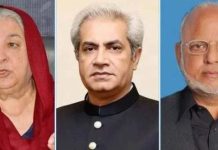Qamar Bashir
The law Minister introduced a bill in parliament today (28.03.20223) to limit the chief justice of Pakistan’s ability to take suo motu notice regardless of the nature, substance, or significance of the matter by subjecting it to the approval of a three-member Supreme Court bench. In addition, the bill proposes to grant the right to appeal the supreme court’s decision in a suo motu case, which includes a case against the former three-time Prime Minister.
The bill appears to have two overarching objectives. The first is to allow Nawaz Sharif to appeal the Supreme Court’s decision to bar him from holding public office, and the second is to clip the wings of upcoming Supreme Court Chief Justice Qazi Faiz Essa, who will take over as Chief Justice of Pakistan (CJP) on September 17, 2023.
The Supreme Court convicted Mr. Nawaz Sharif in the Panama Papers case on allegations of corruption and money laundering in a landmark but highly contentious suomotu decision which removed Sharif from office and imposed a lifetime ban from holding any public office. Sharif could not even file an appeal, as the Supreme Court’s decision was final under the principle of res judicata, which states that a matter that has been finally adjudicated by a competent court cannot be reopened or challenged again.
Maryam’s strategy, which she outlined after returning from London, is becoming clear. Her rhetoric and narrative to balance both sides of the justice balance has started maturing. She and her party have already put enough pressure on the courts by accusing them of siding with Imran Khan while doing injustice to Nawaz Sharif, which they believe needs to be undone by granting Mr. Nawaz the right to appeal and reverse all cases against him, paving the way for his honorable return and subsequent assumption of the party’s leadership during the October elections.
It appears to be a case of you scratch my back while I will scratch yours. The government is dead set on bringing Nawaz Sharif back to power at any cost, and the Establishment did not want an independent and powerful Supreme Court judge in the form of QaziFaizEssa. As a result of this bill, the PML(L) will have its leader back who will be able to challenge Imran Khan, while the establishment will have weakened and truncated the Chief Justice, making him subservient to the other senior most judges allegedly cultivated by the establishment.
However, there are a number of complications. The court was given the power of soumotu by the Constitution, not by subordinate legislation. The Supreme Court is authorized by Article 184(3) of the Constitution to “make any order for the enforcement of any of the fundamental rights conferred by Chapter I of Part II,” as well as “for any other purpose” that the court deems necessary. This broad language has been interpreted by the Supreme Court to include the power of suo motu, which allows the court to take notice of issues of public importance or relating to the enforcement of fundamental rights even in the absence of a formal petition or complaint. whereas, according to Article 189 of the Pakistani Constitution, “all authorities, civil and judicial, in the territory of Pakistan shall act in aid of the Supreme Court,” and “decisions of the Supreme Court shall be binding on all other courts in Pakistan.”This means that once the Supreme Court rules on a case, the decision is final and binding on all lower courts and authorities in Pakistan. There is generally no right of appeal against a Supreme Court decision, except in certain limited circumstances where a review petition or a constitutional petition may be filed before the same court. To clip the wings of the Chief Justice, the relevant provisions of the constitution must be amended, which would require a two-thirds majority, which the government currently lacks.
Another issue is that Supreme Court jealousy protects its independence, which was bestowed upon it by Article 175A, which was added to the Constitution by the 18th Amendment in 2010, and establishes the procedure for appointing judges to Pakistan’s superior courts, including the Supreme Court of Pakistan and the High Courts. According to Article 175A, the Judicial Commission of Pakistan has the authority to appoint judges to the superior courts, guarantees the tenure of judges, and prohibits their removal from office except in accordance with the procedure outlined in the Constitution. Article 50 establishes a system of separation of powers among the three branches of government: the legislature, the executive, and the judiciary declaring Parliament to be the country’s supreme legislative authority. Article 90 delegated executive authority over the Federation of Pakistan to the Prime Minister and the federal cabinet. Article 175 declares the judiciary to be a separate and independent branch of government with the authority to interpret the Constitution and the law. In his famous decision in Sindh High Court Bar Association v. Federation of Pakistan (2010), Justice Chaudhry stated that “the independence of the judiciary is a fundamental principle enshrined in the Constitution and is essential to the rule of law and democracy.” Our memories are still fresh of the Supreme Court’s ruling wherein it declared the deputy speaker’s ruling “contrary to the Constitution and the law, and of no legal effect, and sat it aside.”
This bill apparently has all the ingredients to make it an instrument of the government and the parliament to intervene in the internal affairs of the courts which is likely to receive equal and proportion rebuke by the court.
Another issue is the appointment of Qazi Faiz Essa whose independent and free spirited nature prompted the then-government to file a reference against him which was later quashed by a Supreme Court bench. Once appointed as a chief justice, which appears obvious nevertheless, there are many slips between the cup and the lips, the establishment will have far less say in judicial matters than it did previously. We haven’t heard much from Qazi Essa lately. He is being barred from many high-profile benches, despite the fact that he is the senior most judge, and he is not responding either through his decisions or public statements. It is only a matter of time before he strikes back.
Above all, with no opposition in the national assembly, the bill, even if passed, will lack credibility, legitimacy, and integrity, making it an easy target for the courts to strike it down as soon as it is challenged, which will be sooner rather than later.
The prime minister’s lengthy speech in the parliament today did nothing to establish the need and urgency of presenting this far-reaching bill in parliament, but rather created more doubts and confusions. The government, already weary of dealing with Imran Khan, has opened up a new war front, this time with the judiciary. The public will soon learn whether the judiciary, like Imran Khan, will give the government a hard time or will, unlike him, succumb to its pressure.
The writer is the Former Press Secretary to the President of Pakistan
Former Press Minister in the Embassy of Pakistan to France












